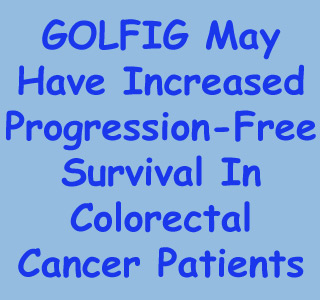
Generally patients with advanced colorectal cancer may be subjected to a combination of chemotherapy and fluorouracil or the derivative product, capecitabine with or without levofolinic acid with irinotecan (FOLFIRI) or oxaliplatin (FOLFOX). These combinations seem to have successfully induced tumor regression, retarding disease progression and increasing overall survival. Yet, the average progression-free survival and overall survival probably are 8 to 10 months and 20 to 22 months, respectively.
“Based on our experience and results to date, we believe that the GOLFIG regimen is superior to FOLFOX chemotherapy in terms of efficacy and comparable in terms of toxicity and cost. We were very surprised to find such a significant difference in terms of overall survival with this low number of patients,†said Pierpaolo Correale, M.D., Ph.D., an oncologist at the Siena University School of Medicine in Italy.
During the study, 130 patients were randomly selected to receive GOLFIG or FOLFOX for a maximum of 12 cycles. Gemcitabine was added to FOLFOX followed by granulocyte-macrophage colony stimulating factor and low-dose aldesleukine (GOLFIG) to boost the immune system and fight cancer. Study subjects were provided with treatment until disease progression. As of now, patients who received GOLFIG reported a progression-free survival of 16.5 months and 7.5 months by those provided with FOLFOX.
The study was presented at the AACR 102nd Annual Meeting 2011, held here April 2-6.

